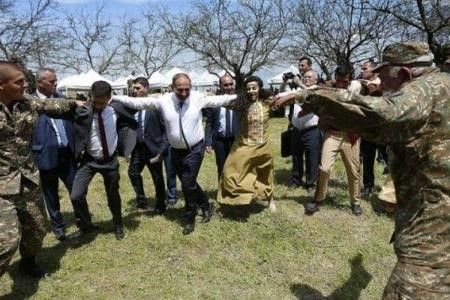Today.Az » Politics » Ambiguous armenian statements harm Armenia more than peace talks with Azerbaijan
26 October 2024 [14:50] - Today.Az

Peace talks between Azerbaijan and Armenia have hit a deadlock due to Yerevan's inconsistent and unbalanced policies. Steps necessary for signing a peace agreement between the two countries are being delayed by Armenia. Moreover, the country's leadership draws attention with various ambiguous remarks. During his recent speech in Parliament, Armenian Prime Minister Nikol Pashinyan discussed the delimitation of the border with Azerbaijan. In response to the opposition's comments on the village of Karki, he mentioned that the border determination is based on the perspective of "historic Armenia," and that the "real Armenia concept" was implemented in Karki. It is interesting to wonder what Pashinyan meant by the "real Armenia concept." In his comment for AZERNEWS, Chairman of the Centre for Political and Legal Research (CPLR/SHAM), Khayal Bashirov stated that the Armenian Prime Minister has been known for his inconsistency since coming to power. "In recent days, we have witnessed how contradictory Nikol Pashinyan's statements have been. It must be noted that this is not a first. Since Pashinyan came to power in 2018, his statements and policies have been marked by contradictions." The expert recalled Pashinyan's earlier speeches and actions. "It should not be forgotten that Pashinyan is the same prime minister who, before the Second Garabagh War, made territorial claims against Azerbaijan with the slogan 'Garabagh is Armenia.' Later, in Shusha, a city internationally recognized as part of Azerbaijan, he was seen dancing drunkenly with the leaders of the so-called 'Artsakh Republic' and other criminal elements." 
The political commentator mentioned that Pashinyan, due to his failure in the Second Garabagh War, now claims to recognize Azerbaijan's territorial integrity in words. "Not long ago, Pashinyan stated in his speeches both in Parliament and at other events that he recognized Azerbaijan's territorial integrity. He also mentioned that negotiations were underway regarding the return of four non-enclave Azerbaijani villages, including Karki. However, today Pashinyan is once again making contradictory statements and, when speaking about the need for constitutional changes in Armenia, noted that the time has come to move to 'Armenia’s real history.'" Bashirov added that while Armenian officials claim to have moved away from the false Armenian myths, they continue to promote the same lies in different forms. "In his speech, Pashinyan implied a transition from the false Armenian history to the current real Armenian history. He noted that they must be content with Armenia’s internationally recognized territories and reject the false, utopian, and deceitful lies of Armenian history. Yet, when speaking about 'real Armenia,' Pashinyan once again uttered contradictory statements." The expert remarked that if we look at true history, there would be no state called Armenia left on the map. "Pashinyan’s criminal predecessors lived with the dreams of Greater Armenia. Now, the Armenian prime minister has coined a new term—'Real Armenia.' But where is the real Armenia? If we exclude Azerbaijan’s historical territories, there might be no land left for Armenia on the map." The expert noted that such ambiguous statements harm the peace process. "As the Azerbaijani side, we advise Armenia, its prime minister, and its government not to use expressions that deny Armenia's own reality. Terms like 'Real Armenia' and 'Greater Armenia' only reveal the true nature of Armenian society and severely damage the peace process. Such inconsistent, ambiguous statements show that Armenia is not truly committed to peace and is far from the peaceful ideas it claims to promote. Their real actions demonstrate something entirely different. They claim to be advancing peace initiatives and are in a rush to sign a peace agreement by November. The Armenian leadership states that all provisions of the peace agreement with Azerbaijan have been agreed upon, trying to mislead and deceive the international community into believing they are committed to peace. They make unsuccessful attempts to portray Azerbaijan as the side delaying and disrupting the peace process. In reality, these contradictory steps and dangerous statements not only harm peace but also inflict the greatest damage on Armenia itself." Note that Armenia still does not provide the required constitutional changes, accurate maps of mines planted in Garabakh, or information on the fate of thousands of Azerbaijanis missing since the First Garabakh War.
|